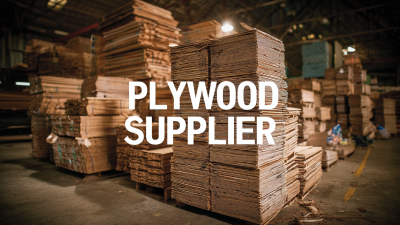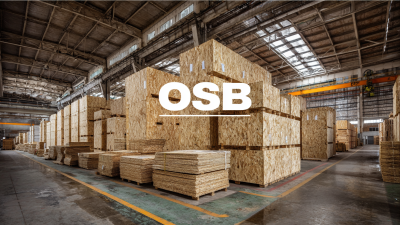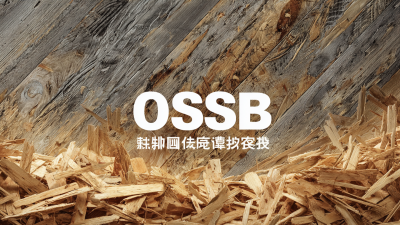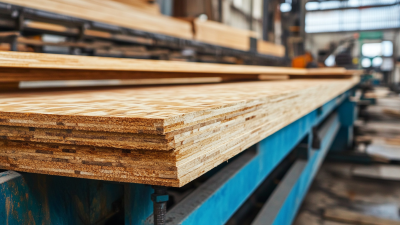Choosing the right plywood supplier is a critical decision that can significantly impact the success of your projects, whether you're in construction, woodworking, or furniture design. With a myriad of options available, it can be overwhelming to determine which supplier will meet your specific needs while providing quality materials. This guide aims to equip you with the knowledge to avoid common pitfalls often encountered in the procurement process. From understanding the different types of plywood to evaluating supplier credibility, we will explore essential factors to consider when making your choice. By being informed and prepared, you can ensure that your partnership with a plywood supplier not only meets your quality expectations but also enhances the overall efficiency and outcome of your projects.

When selecting a plywood supplier for your projects, it's crucial to identify the key qualities that can significantly impact the quality of your materials. First and foremost, reliability is essential. A trustworthy supplier will offer consistent product availability and timely deliveries, ensuring that your project timelines are met without unnecessary delays. Look for suppliers with a solid reputation and positive customer reviews, as this can provide insights into their service quality and product integrity.
Moreover, a good plywood supplier should prioritize transparency in their operations. This includes providing detailed information about their sourcing practices, product specifications, and manufacturing processes. A supplier who can openly share their quality control measures and timber sourcing can help you ensure that the materials you receive are not only durable but also ethically sourced. Additionally, consider their level of customer service. A responsive and knowledgeable staff can make a significant difference, especially when you have questions about product selection or need assistance with a bulk order. By focusing on these qualities, you can choose a plywood supplier who aligns with your project requirements and standards.

When selecting the right plywood supplier, understanding industry standards, grades, and certifications is crucial in ensuring quality and compliance. Starting next year, all plywood sold in India will require ISI certification, marking a significant shift in the industry aimed at enhancing quality control among manufacturers. The Bureau of Indian Standards (BIS) is also tightening the product certification process, which is expected to bolster confidence in the materials being used in construction and manufacturing.
To make informed decisions, consider investing time in researching different plywood grades and their respective certifications. For instance, recognizing that the global plywood market was valued at approximately USD 59.01 billion in 2024 and is projected to reach over USD 104.53 billion by 2033 underlines the growing demand for high-quality plywood products. When selecting suppliers, prioritize those who have third-party certifications to validate their claims of sustainability and material quality.
Tips: Always ask potential suppliers about their certification processes and verify the legitimacy of their claims. Additionally, keep an eye on market trends when evaluating suppliers, as innovations in plywood manufacturing could affect your choices and long-term value.

When selecting a plywood supplier, one of the most important factors to consider is their reputation in the industry. Analyzing customer reviews and testimonials can provide valuable insights into the experiences of others with a particular supplier. Positive feedback often reflects reliability, quality, and customer service, while consistent complaints can highlight potential issues such as subpar products or delayed shipments. By taking the time to research reviews on various platforms, you can form a clearer picture of a supplier's standing and their ability to meet your project needs.
Additionally, it’s crucial to look for testimonials that specifically address the types of plywood you require. Different suppliers may excel in particular areas, such as marine-grade plywood or eco-friendly options. Understanding how past customers have utilized these products can help in assessing whether a supplier aligns with your specifications. Engage directly with customers through forums or social media channels to gain further perspectives; firsthand accounts can reveal nuances that standard reviews may overlook, ultimately guiding you toward the right supplier for your project.
When selecting a plywood supplier, supply chain transparency is crucial to ensure the sustainability and legality of the wood being sourced. Sustainability Manager Jaakko Paloheimo emphasizes that customers benefit from clear insights into the sourcing processes of their suppliers. This transparency not only supports environmentally responsible practices but also adds value by reassuring customers about the origins of the plywood they are purchasing.
To navigate the complexities of wood sourcing effectively, consider these tips: First, always demand proof of sustainability certifications from your supplier. This can include documents that verify compliance with environmental regulations. Second, stay vigilant for red flags that may indicate illegal logging practices, such as inconsistent supply chain documentation or lack of traceability. Lastly, engage directly with your supplier to understand their sourcing practices and the measures taken to ensure the legality and sustainability of their products. By prioritizing supply chain transparency, you can safeguard your business from potential risks associated with environmental crime and unethical sourcing.
| Supplier Criteria | Importance | Common Pitfalls | Quality Assurance Measures |
|---|---|---|---|
| Reputation and Reviews | Critical for assessing reliability | Ignoring customer feedback | Regular customer reviews and testimonials |
| Product Certification | Ensures compliance with industry standards | Not verifying certifications | Requesting and reviewing documents |
| Supply Chain Transparency | Builds trust and reliability | Limited visibility into sourcing practices | Engaging in open discussions about sourcing |
| Pricing Structure | Impacts overall project budget | Choosing based on price alone | Comparing value and price across suppliers |
| Customer Service | Key for support and resolution | Neglecting communication and support channels | Evaluating responsiveness and availability |
When selecting plywood, balancing cost and quality is crucial to ensure you get the most value for your investment. While it may be tempting to choose the cheapest option available, this often leads to poor quality, resulting in higher costs down the line due to replacements or repairs. It's essential to assess the long-term benefits of investing in higher-quality plywood that meets your specific needs.
**Tips:** Always evaluate the grades of plywood offered by suppliers. Higher grades often have fewer defects and better structural integrity, which can save you money on installation and maintenance in the future. Additionally, consider the type of projects you are undertaking; for high-traffic or load-bearing applications, it may be worth spending more upfront for durability.
Another key aspect is to factor in the supplier's reputation and customer service. A slightly higher price could be justified by superior customer support and reliable delivery times. **Tips:** Research reviews and ask for recommendations. Partners who prioritize customer satisfaction are more likely to provide high-quality materials and assistance when you need it.






